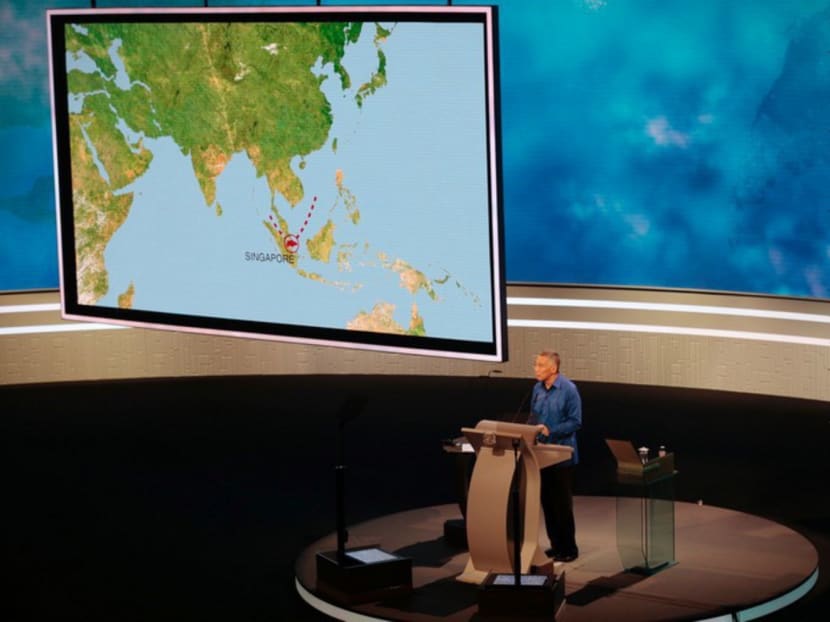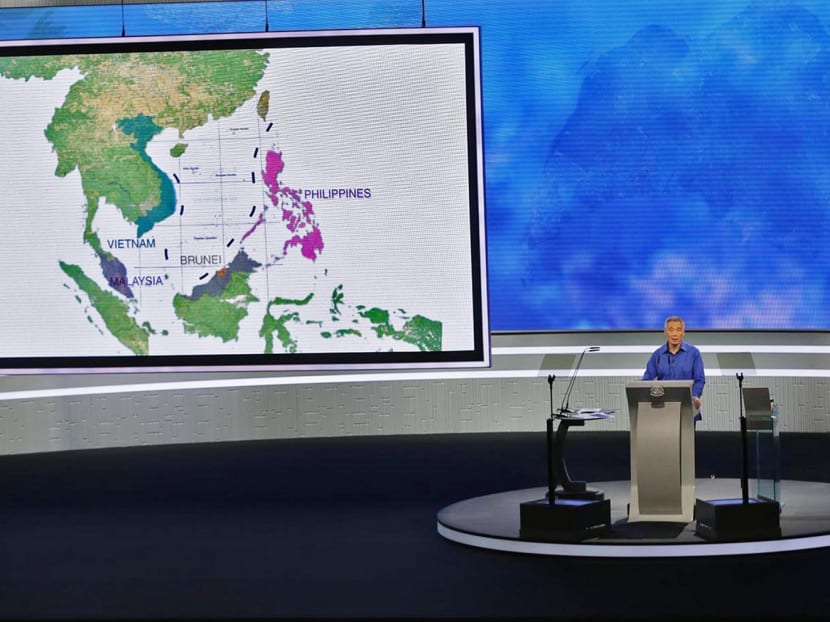Despite superpower pressure, S’pore must choose its ‘own place to stand’
SINGAPORE — While Singapore is good friends with both the United States and China, managing ties with the superpowers is not easy, as their interests will conflict and the Republic will be pressured to choose sides, said Prime Minister Lee Hsien Loong.


SINGAPORE — While Singapore is good friends with both the United States and China, managing ties with the superpowers is not easy, as their interests will conflict and the Republic will be pressured to choose sides, said Prime Minister Lee Hsien Loong.
Speaking at the National Day Rally yesterday on how Singapore can secure its place in the world, PM Lee noted that both Washington and Beijing are aiming to be on good terms with each other.
“Both believe that the Pacific is vast enough to accommodate both powers. President Xi Jinping said recently the US and China should cultivate common circles of friends,” he noted.
“This is precisely what Singapore is trying to do — to be among America’s circle of friends and China’s too.”
But Mr Lee cautioned that managing ties with the superpowers is not so straightforward as the Republic may have differences with them from time to time. For instance, the US protested when Singapore caned American Michael Fay for vandalism in 1994. China has also taken issue with Singapore when it felt the city state did not sufficiently defer to its interests.
“Sometimes the interests of our friends will conflict and we will be pressured to choose sides,” said PM Lee.
He said that Singapore supports the role that the US has played in the Asia-Pacific for more than 70 years since World War II, during which it has spread prosperity through trade and investments, maintained security and stability, as well as enabled countries to thrive and compete peacefully.
“Singapore hopes that the US will keep on doing this, even as China’s influence grows,” said the Prime Minister. He added that Singapore hopes China will also develop and grow well.
“An unstable and backward China will cause Asia great trouble, as happened during the 1950s and 1960s,” said PM Lee.
There are signs of simultaneous cooperation and competition between Washington and Beijing. While both are working closely in several areas such as promoting bilateral investments and combating climate change, there are political differences over the South China Sea and North Korea’s nuclear programme.
“We (Singapore) are not pro-US or pro-China or anti-anyone. We stand for ourselves and hope our friends understand,” said Associate Professor Simon Tay, chairman of the Singapore Institute of International Affairs to TODAY.
“Some parts of China and of USA will always feel we don’t do enough for them. But rationally I hope all parties can see (the) principle and also value in what Singapore brings to the table,” added Assoc Prof Tay, who was present at yesterday’s rally.
PM Lee cautioned that one issue that may upset the stability of the region is the complicated South China Sea dispute. Beijing claims almost the entire South China Sea, through which more than US$5 trillion (S$6.7 trillion) in shipborne trade passes every year. Brunei, Malaysia, the Philippines, Taiwan and Vietnam also have claims in the sea, believed to be rich in energy deposits.
Beijing has conducted massive reclamation in the disputed waterway, with latest satellite imagery showing what appears to be China building military aircraft hangars on disputed reefs. Washington has launched a series of patrols in the South China Sea, ostensibly to uphold freedom of navigation, drawing Beijing’s ire.
An arbitration court in The Hague ruled on July 12 that China had no historic title over the busy waterway and had breached the Philippines’ sovereign rights there.
The decision infuriated Beijing, which dismissed the court’s authority to rule on the matter.
PM Lee outlined that Singapore’s interests in the South China Sea are upholding international law and the peaceful settlement of disputes; freedom of navigation; and a united and effective Association of South-east Asian Nations (Asean).
He said that for small countries like Singapore, upholding international law is of vital interest as it is how disputes with other countries can be peacefully settled.
“If rules do not matter, small countries like Singapore have no chance of survival,” he noted.
PM Lee said that the South China Sea and Straits of Malacca are “two vital arteries” linking Singapore to the world, as he showed a map illustrating major regional sea lanes.
“If one or the other is blocked or cut off, we will be choked,” he noted.
PM Lee said that Asean has found it very hard to take a clear and common stand on the South China Sea issue because its members have different interests.
The grouping’s credibility has been dented as it has struggled to come to a common position over the South China Sea, with some member states said to have come under pressure from Beijing. Some member states are close to China, like Laos and Cambodia, while others like the Philippines and Thailand are treaty allies of the US, pointed out the Prime Minister.
“But if Asean cannot deal with a major issue like this (South China Sea) on its doorstep affecting its members, in the long run, nobody will take Asean seriously,” he cautioned.
PM Lee said that Singapore has its own principled and consistent stand on the South China Sea issue, and this is different from that of China, the Philippines and the US.
“Other countries will persuade us to side with them one side or the other. We have to choose our own place to stand, what is in our interests, calculate, choose a spot, stand firm, cannot succumb to pressure,” he said.
Commenting on the key messages in the National Day Rally message, Dr Mustafa Izzuddin, a fellow at the Iseas-Yusof Ishak Institute told TODAY that “The part of Prime Minister Lee Hsien Loong’s speech devoted to foreign policy was expansive, realist, and focused on the protection of Singapore’s national interests as well as preservation of Singapore’s august reputation in the world.
“Through the adept use of visuals and maps, Prime Minister Lee outlined the fundamentals and priorities of Singapore’s foreign policy in such a way that it was simple enough for everyone, including the laymen, to understand and appreciate both Singapore’s vulnerability and advantageousness as a small state in the international community,” he added.









